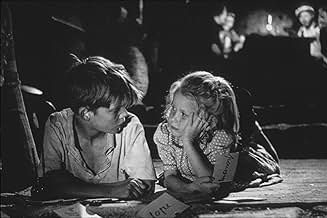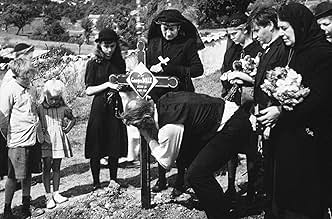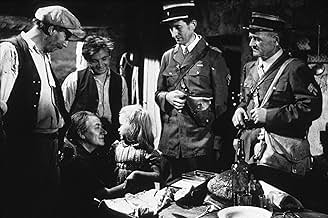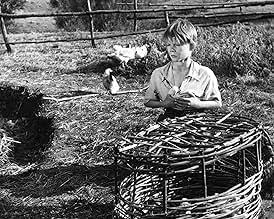CALIFICACIÓN DE IMDb
8.0/10
14 k
TU CALIFICACIÓN
Una joven francesa, huérfana tras un ataque aereo Nazi, se hace amiga del hijo de un granjero pobre, y juntos intentar dar sentido a la realidad de la muerte.Una joven francesa, huérfana tras un ataque aereo Nazi, se hace amiga del hijo de un granjero pobre, y juntos intentar dar sentido a la realidad de la muerte.Una joven francesa, huérfana tras un ataque aereo Nazi, se hace amiga del hijo de un granjero pobre, y juntos intentar dar sentido a la realidad de la muerte.
- Dirección
- Guionistas
- Elenco
- Nominado a 1 premio Óscar
- 8 premios ganados y 2 nominaciones en total
Marcel Mérovée
- Raymond Dollé
- (as Pierre Merovée)
Denise Péronne
- Jeanne Gouard
- (as Denise Perronne)
Marie-Pierre Casey
- Infirmière
- (sin créditos)
André Enard
- Le premier gendarme
- (sin créditos)
Marcelle Feuillade
- La mère de Paulette
- (sin créditos)
Roger Fossey
- Le père de Paulette
- (sin créditos)
Opiniones destacadas
Wonderfully wry, ribald, and ironic look at children, life, and death in the provinces. This must be one of the best examples of poetic realism much better than any Renoir you'll see it's alive and humane, comprising a hundred little iconic cinema moments and several major ones.
A little girl, whose parents are killed in an air-raid at the beginning, wanders into a nearby farm clutching her dead dog and is taken in. She becomes attached to the boy at the farm and they start to expand her dog's grave into a little cemetery of dead animals. There's nothing macabre or sinister about this, nor (as the blurbs maintain) is it particularly a statement about the effect of war on children - it's simply the sort of thing kids might do. When they start pinching crosses from the real cemetery though, they are in for it.
The peasant family are a hoot. The father has a hilarious running feud with his neighbour; the daughter is having an illicit affair with the neighbour's son; the elder son succumbs to a tragi-comic demise after an innocuous accident; the second is a good-natured hick; and the youngest boy gets clouted by his father at every turn ("Take that!", says the father as he smacks him across the head "...and that!" says his sister as she plonks some flowers into his hand). Their every movement is bursting with rough humour and vitality and we are being shown something interesting in every frame. It comes vividly to life, and as an evocation of childhood is up there with Selznick's Tom Sawyer and "Spirit of the Beehive".
Remarkable performances from the two children. There's no sanctimoniousness or even self-awareness to it; Clement got it down and it came out right.
A little girl, whose parents are killed in an air-raid at the beginning, wanders into a nearby farm clutching her dead dog and is taken in. She becomes attached to the boy at the farm and they start to expand her dog's grave into a little cemetery of dead animals. There's nothing macabre or sinister about this, nor (as the blurbs maintain) is it particularly a statement about the effect of war on children - it's simply the sort of thing kids might do. When they start pinching crosses from the real cemetery though, they are in for it.
The peasant family are a hoot. The father has a hilarious running feud with his neighbour; the daughter is having an illicit affair with the neighbour's son; the elder son succumbs to a tragi-comic demise after an innocuous accident; the second is a good-natured hick; and the youngest boy gets clouted by his father at every turn ("Take that!", says the father as he smacks him across the head "...and that!" says his sister as she plonks some flowers into his hand). Their every movement is bursting with rough humour and vitality and we are being shown something interesting in every frame. It comes vividly to life, and as an evocation of childhood is up there with Selznick's Tom Sawyer and "Spirit of the Beehive".
Remarkable performances from the two children. There's no sanctimoniousness or even self-awareness to it; Clement got it down and it came out right.
I am incapable of writing reams about films I admire because words do no justice to the magic they conjure.
FORBIDDEN GAMES left me speechless when I first saw it two decades ago.
It is ABOUT two French children, a peasant boy, a Parisian girl, who become close friends as World War 2 ravages Europe.
The film LOOKS at the way warfare effects the innocent and transforms one's view of death.
Director Rene Clement sets the story in a rural village and peoples his story with some of the most authentic characters ever to tred the silver screen. He employs humour, horror and humanism to tell his story and solicits an incredible performance from moppet Brigitte Fossey.
It's a tearjerker, too, it's emotionally delicate, and it's perfectly manipulated drama -- all good drama is.
Its power is its apparent simplicity.
A love letter to cinema that is also one of the greatest and most haunting war movies ever made.
The imagery and the heart-rending music score will remain with you forever.
FORBIDDEN GAMES left me speechless when I first saw it two decades ago.
It is ABOUT two French children, a peasant boy, a Parisian girl, who become close friends as World War 2 ravages Europe.
The film LOOKS at the way warfare effects the innocent and transforms one's view of death.
Director Rene Clement sets the story in a rural village and peoples his story with some of the most authentic characters ever to tred the silver screen. He employs humour, horror and humanism to tell his story and solicits an incredible performance from moppet Brigitte Fossey.
It's a tearjerker, too, it's emotionally delicate, and it's perfectly manipulated drama -- all good drama is.
Its power is its apparent simplicity.
A love letter to cinema that is also one of the greatest and most haunting war movies ever made.
The imagery and the heart-rending music score will remain with you forever.
I am really drawn to art that makes clean choices about messy things in order to deliver the richness of the mess cleanly.
Its a complicated set of tradeoffs, part abstracting things away, part enriching or amplifying things. Cinema is different than any other art because nominally we presume we are seeing reality. The people and things we see are real and the situations seem real.
But what we actually get is refined. There are two pleasures to such projects. One is the inhaling of the world we are presented with, then living with it as it commingles with our blood. The other is a sort of external appreciation of what choices were made, how expertly the arrows were made, and what craft there was in how we were tracked and captured.
This is a wonderful film in both respects and likely will stay with you dually for the rest of your life. Clean and messy.
One of the messes is accidental, as is probably true in most real art. The story is truncated abruptly because funding was. If you didn't know that, you might be amazed at how adroitly this storyteller dropped the narrative to keep us in the story once it has ended. And you might marvel at how appropriate that is, given the girl's own loss of story.
The nominal threads are about losses and the superficialities of religion to cover them. This is wrapped in an evocation of dear childhood, innocence, deep bonds, impulsive large projects. And of course, adults who have no idea of the real world nor appreciation for the bonds to it. We can get all this because the ordinary skills (acting, writing, staging) are performed so well that they get out of the way.
(However, along the way we become aware that the filmmaker murders a finally twitching puppy before our eyes.)
I'd like to highlight the external view, the one that looks as what is refined and what leavened. Simplified in story thread and child's perspective. Enriched in emotion, engagement and unexpected shape. Its sweet and dark both. Its emotionally casual and deeply affecting both. Its both distinctly French and universal, something that is rare in my experience. Bresson can't touch this.
Ted's Evaluation -- 3 of 3: Worth watching.
Its a complicated set of tradeoffs, part abstracting things away, part enriching or amplifying things. Cinema is different than any other art because nominally we presume we are seeing reality. The people and things we see are real and the situations seem real.
But what we actually get is refined. There are two pleasures to such projects. One is the inhaling of the world we are presented with, then living with it as it commingles with our blood. The other is a sort of external appreciation of what choices were made, how expertly the arrows were made, and what craft there was in how we were tracked and captured.
This is a wonderful film in both respects and likely will stay with you dually for the rest of your life. Clean and messy.
One of the messes is accidental, as is probably true in most real art. The story is truncated abruptly because funding was. If you didn't know that, you might be amazed at how adroitly this storyteller dropped the narrative to keep us in the story once it has ended. And you might marvel at how appropriate that is, given the girl's own loss of story.
The nominal threads are about losses and the superficialities of religion to cover them. This is wrapped in an evocation of dear childhood, innocence, deep bonds, impulsive large projects. And of course, adults who have no idea of the real world nor appreciation for the bonds to it. We can get all this because the ordinary skills (acting, writing, staging) are performed so well that they get out of the way.
(However, along the way we become aware that the filmmaker murders a finally twitching puppy before our eyes.)
I'd like to highlight the external view, the one that looks as what is refined and what leavened. Simplified in story thread and child's perspective. Enriched in emotion, engagement and unexpected shape. Its sweet and dark both. Its emotionally casual and deeply affecting both. Its both distinctly French and universal, something that is rare in my experience. Bresson can't touch this.
Ted's Evaluation -- 3 of 3: Worth watching.
A classic French foreign film, one of the best. A necessity for every foreign film lover's video library, along with Cinema Paradiso and Life Is Beautiful. This film haunts you and stays with you long after the film flashes its "finis". Part of this is due to the musical soundtrack, with its romantic guitar melodies, part of it has to do with the sadness of the storyline....the little girl's losing her parents and beloved dog early in the picture, but mostly the film lingers in your heart because of the outstanding performances by the child actors in this film, Georges Poujouly who plays Michel, and especially Brigitte Fossey as Paulette. Her little innocent face expresses all the horrors and trauma of war, what all the millions of children must have felt who were caught up in the barbarism of World War Two, when the security of a loving home was pulled out from under them. Never has the agony of a human being's suffering been so well captured on film, and I think Brigitte was all of six years old when she performed in this movie. A remarkable feat.
This movie is a solid reminder of how a film does not need to be graphically violent, sex- ridden, and controversy-drenched to really affect the viewer. I picked this movie up from my local library and have watched it twice in the last two days. I chose this title simply because it bore the Criterion Collection emblem on the jacket cover and I had heard nothing about the movie at all before that time.
That being said, i knew very little of what to expect nor would i be prepared for the power of this movie.
From the opening scenes, the audience is thrown into a world of chaos and terror. This world is then filtered through the eyes of Paulette, a young french girl, as she struggles to find safety and peace from the destruction and displacement of world war two. She meets a young farm-boy, Michel, with whom she instantly bonds. Michel and Paulette begin to play games (hence the title) and create worlds separate from the noise and confusion of adults. Together they search for peace within their microcosm, and, in their own way, serve as symbols for love and friendship as Michel attempts to constantly make Paulette happy and Paulette, in turn, gives Michel something his large family never has time to award him: love.
Through breathtaking cinematography and flawless acting, Forbidden Games captivates and holds that captivation for its entirety. With strong anti-war messages this film still pertains to the present and will continue to stay relevant so long we as a human race continue to make war. There will always be children that will have to somehow rationalize the seemingly unfathomable actions of adults and there will always be adults who should turn to their children to learn the simple pleasures of life ignored in the bustle of growing old.
That being said, i knew very little of what to expect nor would i be prepared for the power of this movie.
From the opening scenes, the audience is thrown into a world of chaos and terror. This world is then filtered through the eyes of Paulette, a young french girl, as she struggles to find safety and peace from the destruction and displacement of world war two. She meets a young farm-boy, Michel, with whom she instantly bonds. Michel and Paulette begin to play games (hence the title) and create worlds separate from the noise and confusion of adults. Together they search for peace within their microcosm, and, in their own way, serve as symbols for love and friendship as Michel attempts to constantly make Paulette happy and Paulette, in turn, gives Michel something his large family never has time to award him: love.
Through breathtaking cinematography and flawless acting, Forbidden Games captivates and holds that captivation for its entirety. With strong anti-war messages this film still pertains to the present and will continue to stay relevant so long we as a human race continue to make war. There will always be children that will have to somehow rationalize the seemingly unfathomable actions of adults and there will always be adults who should turn to their children to learn the simple pleasures of life ignored in the bustle of growing old.
¿Sabías que…?
- TriviaIn a television interview ("Vivement Dimanche Prochain", France 2, 17 April 2005) Brigitte Fossey, who played the little Paulette, revealed that the film had originally been shot as a short, and then it was later decided to extend it into a feature film. Unfortunately she had lost her milk teeth and Georges Poujouly (who plays the boy Michel) had had his hair cut to play in Todos somos asesinos (1952). So, in many scenes of the movie Paulette has false teeth and Michel is wearing a wig.
- ErroresThe poor parents are killed by a Focke-Wulf 190. This kind of plane didn't exist at the moment of the "battle of France" in May and June 1940.
- Créditos curiososThere are two alternate opening credits:The main credit starts with a story book and a female hand opens the book to reveal the credits. The alternate still has the same book but this time we are introduced to the two main characters who are sitting by a lake. In this version, Michel's hand is turning the page and in between the scenes he tells Paulette that he's going to tell a story.
- ConexionesFeatured in Le ciné-club de Radio-Canada: Film présenté: Jeux interdits (1959)
Selecciones populares
Inicia sesión para calificar y agrega a la lista de videos para obtener recomendaciones personalizadas
- How long is Forbidden Games?Con tecnología de Alexa
Detalles
- Fecha de lanzamiento
- País de origen
- Sitio oficial
- Idioma
- También se conoce como
- Forbidden Games
- Locaciones de filmación
- Productoras
- Ver más créditos de la compañía en IMDbPro
Taquilla
- Total en EE. UU. y Canadá
- USD 33,284
- Fin de semana de estreno en EE. UU. y Canadá
- USD 4,316
- 26 abr 2015
- Total a nivel mundial
- USD 33,897
- Tiempo de ejecución1 hora 26 minutos
- Color
- Relación de aspecto
- 1.37 : 1
Contribuir a esta página
Sugiere una edición o agrega el contenido que falta

Principales brechas de datos
By what name was Juegos prohibidos (1952) officially released in India in English?
Responda


























